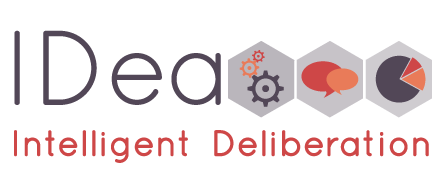The Evidence Hub concept reflects our need for better ways to pool, map and harness what a community knows. The Evidence Hub is a collaborative knowledge-building (specifically evidence-building) web platform. It was designed in KMi by the team developing the concept of “Contested Collective Intelligence” [1,2], where it is important to understand different perspectives and support quality debates. The first Evidence Hub was developed for the Open Learning Network project [3], and further refined in the Communities of Practice for Health Visiting project [4].
An Evidence Hub provides novel visual analytics designed to give insight into, and provoke reflection on, users’ knowlege-building activity. It is designed for use by practitioner communities/networks engaged in informal learning, and by students in more formal educational contexts.
The Evidence Hub is designed to answer questions such as:
• Who in my region is working on this problem?
• Are there any partnerships between projects in these two areas, on this theme?
• What are the key challenges we’re facing?
• Who has potential solutions to these, and what’s the evidence that they work?
• What evidence-based claims can we make with confidence?
• What are the most controversial issues?
The Evidence Hub concept has taken off. Examples of Hubs run in collaboration with external partners are the Community of Practice for the Institute of Health Visiting (a closed Hub) and the Systems Learning & Leadership Hub (University of Bristol). OU community Hubs include the OU in Scotland’s Work & Learning Hub (Lead: Ronald Macintyre), and FELS through their Hubs for Reading for Pleasure (Lead: Prof. Teresa Cremin), and Research by Children & Young People (Lead: Prof. Mary Kellett).
The concept continues to evolve and be adapted to other contexts. See for example the Impact Map within IET’s OER Research Hub [5], and the Debate Hub for social innovation (our EC Catalyst Project 2013-15).
Sources
[1] De Liddo, Anna; Sándor, Ágnes and Buckingham Shum, Simon (2012). Contested Collective Intelligence: rationale, technologies, and a human-machine annotation study. Computer Supported Cooperative Work (CSCW), 21(4-5) pp. 417–448. http://oro.open.ac.uk/31052
[2] De Liddo, Anna and Buckingham Shum, Simon (2013). The Evidence Hub: harnessing the collective intelligence of communities to build evidence-based knowledge. In: Large Scale Ideation and Deliberation Workshop, 29 June – 02 July 2013, Munich, Germany. http://oro.open.ac.uk/38002
[3] De Liddo, Anna; Buckingham Shum, Simon; McAndrew, Patrick and Farrow, Robert (2012). The open education evidence hub: a collective intelligence tool for evidence based policy. In: Cambridge 2012: Joint OER12 and OpenCourseWare Consortium Global 2012 Conference, 16 – 18 April 2012, Cambridge, UK. http://oro.open.ac.uk/33253
[4] Ikioda, F. , Kendall, S. , Brooks, F. , De Liddo, A. and Buckingham Shum, S. (2013) Factors That Influence Healthcare Professionals’ Online Interaction in a Virtual Community of Practice. Social Networking, 2, 174-184. http://dx.doi.org/10.4236/sn.2013.24017
[5] Open Education Research Hub: http://oerresearchhub.org


